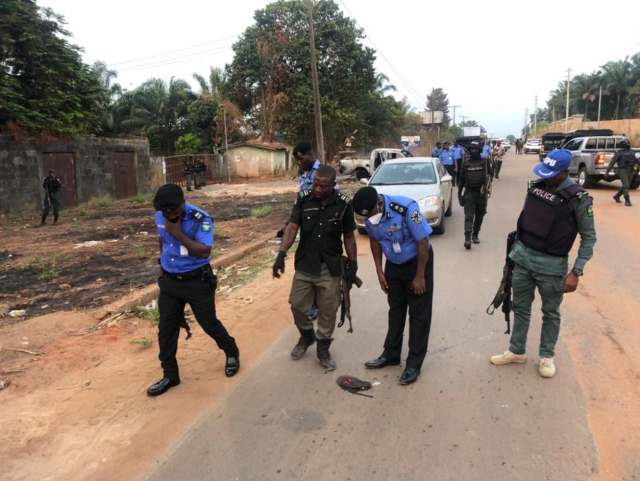By Martin Cole-
Police are still investigating why seven police officers were shot dead in Nigeria’s oil-rich Rivers State on Friday.
Gunmen opened fire on a checkpoint in the southern state, then drove to two police stations, killing officers and burning patrol cars, police say.
The reason behind the killings are not known, but it is seen as a symptom of the appalling state of security in the country.
Sources at the Nigerinan Premium times pointd out that another 9 other police officers have been killed in separate incidences in Nigeria, bringing the total number of dead officers to 16 officers.
Rivers state is one of the cities in Nigeria where airline passengers from abroad are frequently warned to avoid because of the rampant level of kidnapping, and uncontrollable level of crime.
Police killed two of the attackers but are still searching for those who escaped.
The unidentified armed men, driving a Toyota Hilux van, launched their “surprise assault” on the checkpoint at Choba Bridge at around 20:30 local time (19:30 BST) on Friday, police spokesperson Nnamdi Omoni said.
Patrol Car Fire
After shooting dead two police officers at the checkpoint, the thugs killed two more officers and set fire to a patrol car at Rumuji police station, Mr Omoni said. Police fired back there and killed two of the attackers, he said.
Three further officers were killed at the Elimgbu police station, he added. A number of police officers and soldiers have also been killed in the region in recent weeks, prompting a night-time curfew.
Authorities blamed that attack on the banned separatist group, the Indigenous People of Biafra (Ipob). The group campaigns for independence for the south-eastern region, where the ethnic Igbo people form the majority.
Ever since the Biafran war from 1967-1970, the power struggle for dominance has spiralled out of control and sparked mounting tension in the South South part of Nigeria, while other parts of the country especially the North, is experiencing a war like situation.
Police officers in Nigeria, have themselves been notorious for killing civilians for many years, more recently protesters.
Last month, Rivers State banned people crossing its borders at night in a bid to stop killings of police, customs, civil defence officers and army soldiers.
National Aspirations
Biafra represented nationalist aspirations of the Igbo people, whose leadership they concluded could no longer coexist with the Northern-dominated federal government. The conflict resulted from political, economic, ethnic, cultural and religious tensions which preceded Britain’s formal decolonization of Nigeria from 1960 to 1963.
Immediate causes of the war in 1966 included a military coup, a counter-coup and persecution of Igbo living in Northern Nigeria. Control over the lucrative oil production in the Niger Delta also played a vital strategic could no longer coexist with the Northern-dominated federal government.
The conflict resulted from political, economic, ethnic, cultural and religious tensions which preceded Britain’s formal decolonization of Nigeria from 1960 to 1963.
Immediate causes of the war in 1966 included ethno-religious violence and anti-Igbo pogroms in Northern Nigeria, a military coup, a counter-coup and persecution of Igbo living in Northern Nigeria. Control over the lucrative oil production in the Niger Delta also played a vital strategic role
Islamist militancy in the north-east and banditry in the north-west, where 700 children have been taken from schools in the past five months has also been a major problem in Nigeria.




